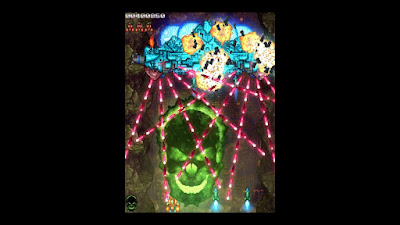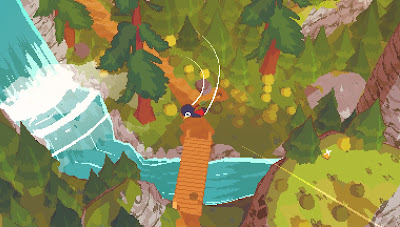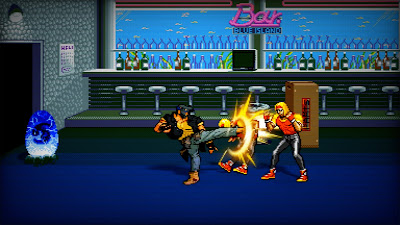Astalon: Tears of the Earth is an action-platformer that often reads as a grand summation of one corner of 8-bit gaming. Level layouts are non-linear and full of secrets, like a Metroid; while screens themselves are block coloured and ruthlessly staffed with enemies, similar to a NES era Mega Man. The lack of flicker and an (eventual) ability to instantly swap between the three colour-coded dungeon dwellers indicate that LABSworks' game is, very obviously, operating far beyond the scope of an 80s system but the same sort of cute-but-twitchy compulsion remains.
Like basically everything else on this list, Crisis Wing is a throwback. In this instance a note perfect evocation of the unloved - almost off-putting - chunky colourful shooters that made up the numbers in 1980s arcades. Pieslice Productions' game is a vertical scroller very specifically in the vein of Toaplan's Mega Drive hit Truxton; a no-frills, Yamaha synthesiser, score attack that has players struggling through the kind of synchronised enemy waves that recall the early, elemental, mechanics that underpin this genre. Crisis Wing's best component is an exceptionally difficult Buss Rush setting that limits both lives and screen shattering smart bombs. It's a mode that demands a completely different frame-of-mind than the main game - all hope is extinguished; deaths are incessant and unavoidable, all you can do is try and lose your ships at opportune times.
Deathloop is a late entry onto this list. Bought in a Christmas sale, Arkane Studio's game quickly nudged out the likes of Carrion and Call of Duty: Warzone's blown-out Pacific rethink with its sneaky, temporal, hijinks. Players creep about as Colt, an amnesic security guard who begins every day shivering his way through a beachbound hangover. Although I've barely made a scratch at this point, Deathloop's qualities are clear and iterative - the player slowly picks apart each section of this frozen island to discover where and when several high-value targets will make themselves vulnerable on an endlessly regurgitating day.
A hold-over from late last year, Demon's Tilt is a Satanic, 16-bit, pinball game recompiled for the modern era. Like the ancient ROMs that Flarb LLC and WIZNWAR's game embellishes - most obviously Compile's Devil's Crush and Technosoft's Mega Drive conversion Devil Crash MD (known as Dragon's Fury in the US) - Demon's Tilt takes place on a massive, multi-screen, pinball table; one seemingly hexed by diabolical, high-score granting, creatures.
Rough around the edges - particularly in terms of how the player is expected to discern which onscreen effects are environmental hazards and which are, simply, graphical flourishes - R-Type Final 2 still manages to evoke the same strange, funereal, effect as its PS2 predecessor. Whereas most side-scrolling shooters prioritise a sense a propulsion, as if the player is controlling a streaking missile, Final 2 is trepidatious. Crafts nervously crawl through the levels, as if hoping not to stir some sleeping titan, while the enemy encounters are often revealed like ambushes - robots burst from rotting shipping containers in the first stage. Above all though, Granzella's crowd funded sequel gets the little things right - the shriek of a charging blast attack or the satisfied purr when that banked beam reaches its most ruinous pulse.
Despite a dull pre-release demo and an opening hour that leaves the player feeling like they're stuck in a series of static encounters, Resident Evil Village eventually reveals itself to be the best instalment in the series since the 4th - recent remakes included. Notionally tasked with hunting down the chimeric chancers who have kidnapped your infant daughter, Village's best loops happen off the beaten track, when you're circling back to previously cleared areas to see how the always advancing time of day has effected layouts. Has a new enemy type gotten loose in the field? Are you now able to access a rowing boat that allows you to reach a previously unexplored dock? Village also see the return of incrementally upgradable weaponry, a feedback drip-feed so consistently satisfying that you wonder why Capcom made such a concerted effort to forget about it.
Almost ludicrously difficult - notably so before the temporary save solution was patched in - Housemarque's Returnal is, nevertheless, a complete to dream to play. Movement, both in terms of dashing lunges and locking to static structures when dodging incoming fire, is beautifully implemented. At its best, the game feeling very much like the natural successor to both Devil May Cry 3's Trickster input style and PlatinumGames' Vanquish. Like these Japanese stalwarts, Returnal gifts players the ability to absolutely gobble up the game's prehistoric, Acheron adjacent, scenery; blazing from one end of a fossilised alien play area to another.
Charm itself, A Short Hike sees players steering a worried bird around a trail that gets increasingly vertical, necessitating they collect discarded feathers to prolong their ability to stay off the ground. Adam Robinson-Yu's game is autumnal, a low-polygonal shimmer that can be rushed through - players combing the island for power-ups allowing them to scale a sheer mountainside - or slowly picked apart with a relaxed hunt for side-quests. Mark Sparling's music is of special note, a wholesome and lightly heroic suite that uses electronic samples straight out of the 32-bit era.
Downloadable content that not only expands the scope of the base game but introduces mechanical corrections and flourishes that seem to redefine what another, future, Bare Knuckle instalment could be. As well as embellishing the story mode with three fresh characters, Streets of Rage 4 - Mr. X Nightmare introduces a survival sim presided over by Streets of Rage 3's Dr. Zan. Players fight through randomly generated stages - with backgrounds and layouts culled from as far a field as the Game Gear conversion of the original game - with levels ending once all foes are beaten back. Our pugilists are then given the choice of two power-ups; persistent choices that can be used to sculpt a fire-breathing tank or an electrified glass cannon.
A squishy, squelchy, store shooter; Void Gore begins with the player as a terminally ill-equipped suppository ship blasting their way up an arterial vein. Encircled by swarms of eyes and chomping meat balls, Void Gorers must hammer away at low yield, repeat passes before they amass enough in-game currency to really trouble the game's laser bleeding organs. Although, obviously, the player ends their trophy run significantly stronger than is necessary to peel back the first half-dozen stages, Void Gore quickly finds a sweet spot, a state of play in which inputters are, purely, responding to flashing patterns that mean to kill.











No comments:
Post a Comment